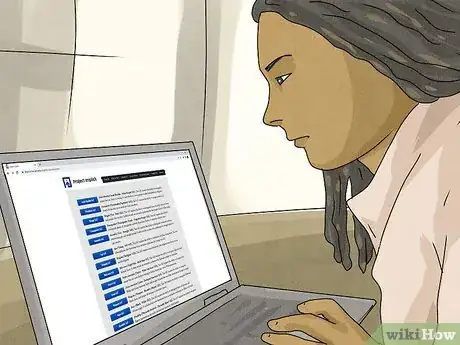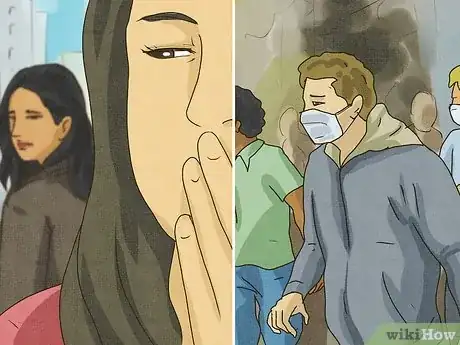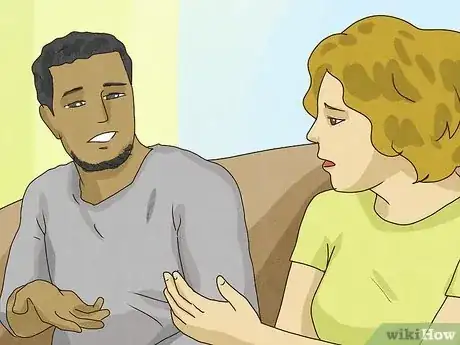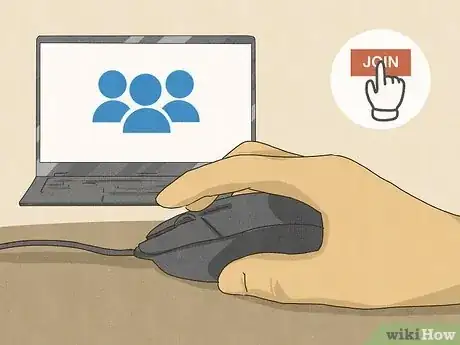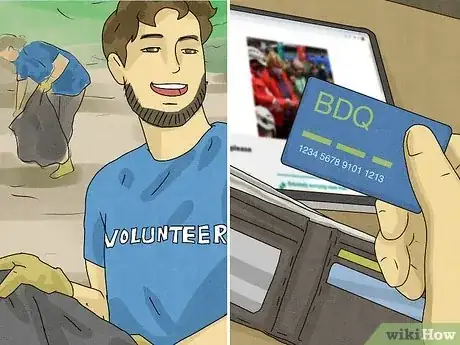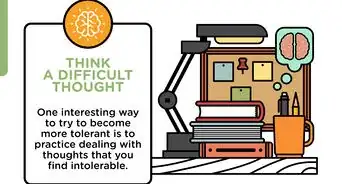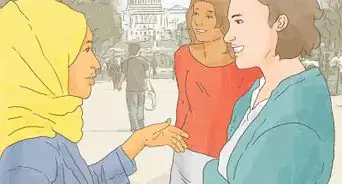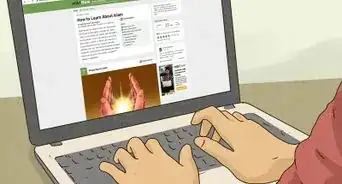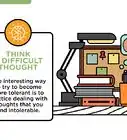This article was co-authored by Rachel Kove. Rachel Kove is a Certified Recovery Coach, Serial Entrepreneur, Published Author, Mental Health Advocate, and Actress with over 13 years of experience. She recently developed and became Co-Owner of Transformational Solutions, a life coaching program specializing in addiction, trauma, and personal development. Rachel also co-created the V.I.S.I.O.N.S program, an online self-improvement curriculum designed to help people get unstuck emotionally and accomplish their goals. Additionally, she co-hosts the weekly podcast “Kicking it With The Koves” alongside her brother and father, Jesse and Martin Kove.
There are 10 references cited in this article, which can be found at the bottom of the page.
This article has been viewed 93,183 times.
Stigma (societal stereotypes), prejudice (negative beliefs that you think are true about a person or group of people), and discrimination (actions against a person or group due to prejudice) can result in tense surroundings and mental health issues.[1] Having prejudice and interacting with different races can actually lower your executive brain functioning; this is due to the idea that highly prejudiced individuals must exert much energy self-regulating their behaviors. In order to fully overcome prejudice, you must work toward lessening your own prejudice as well as fighting to end prejudice on a societal level. You can overcome prejudice by challenging your own biases, increasing your social connection, and coping healthfully with prejudice.
Steps
Challenging Your Biases
-
1Assess your own biases. In order to combat your own biases, you first need to know what they are. In social psychology there are tools used to assess implicit feelings and beliefs about different individuals; these are called Implicit Association Tests (IAT).[2] These tests will tell you your level of inherent bias toward certain groups of people.
- You can take an IAT, created by Harvard University, on any number of topics including sexuality, religion, and race. These tests can be found online.[3]
-
2Keep yourself accountable. A prejudice is a kind of handicap to your perspective as it forbids you to think beyond your assumptions and builds a virtual wall around your objective thinking. Your own implicit and explicit attitudes toward individuals of a different race, for example, strongly predicts how friendly you will be toward them (both verbally and nonverbally).[4]
- When dealing with internalized stereotypes, ask yourself questions like "Why do I feel this way?" and "Where does this belief come from?" You can also challenge these stereotypes by asking yourself if you'd be comfortable teaching them to someone else.
- Acknowledge your own biases and prejudices, and actively replace them with more reasonable alternatives.[5] For example, if you think something stereotypical about a certain gender, religion, culture or race (i.e. blondes are dumb, females are moody, ), remind yourself that this is a bias against that group and that you are over-generalizing.
Advertisement -
3Recognize the negative effects of prejudice. In order to reduce prejudice or bias in yourself, it may be helpful to identify and understand the effects that your biases can have on others. Being a victim of prejudice or overt discrimination can result in devastating mental health effects.
- Dealing with prejudice and discrimination can lead to low self-esteem and depression as well as reductions in adequate health care, housing, education, and employment.[7]
- Being in a situation where someone is prejudiced against you can lead to a decrease in your self-control.[8]
- Remind yourself that if you have biases against others they may lead to dire consequences for those individuals.
-
4Reduce self-stigma. Some individuals may have internalized self-stereotypes or prejudices.[8] Self-stigma occurs when you have a negative belief about yourself. If you agree with the belief (self-prejudice), it can lead to negative behaviors (self-discrimination).[9] An example of this would be if someone has a negative belief that his mental illness means that he is “crazy.”
- Identify the possible ways you stigmatize yourself and actively attempt to change these beliefs. For example, instead of thinking, “I’m crazy because I have a diagnosis,” you can change this to, “Mental illnesses are normal and a large amount of the population has them. This does not mean I am crazy.”
Increasing Social Connection to Reduce Your Biases
-
1Surround yourself with a variety of people. Diversity may also be a factor that contributes to an ability to cope well with prejudice.[10] If you are not exposed to different races, cultures, sexual orientations, and religions, you cannot fully accept the diversity that exists in the world. When we really get to know someone is when we stop judging and start listening and learning.
- One way to experience diversity it to travel to another country, or even town. Every small city has its own culture including popular foods, traditions, and activities. For example, people in the city may have different experiences than people in the country – simply because of the environment.
- It's important for people to be curious and look for both the similarities and differences that we have with other people. Similarities create opportunities for compassion, love, and understanding, while differences make us separate individuals.
- Remember—each and every individual has their own story, their own background, their own parents, and their own sets of ideals and morals.
-
2Be around people you admire. Expose yourself to individuals different from you (racially, culturally, gender, sexuality, etc.) whom you look up to or admire. This may help change implicit negative attitudes toward members from different cultures.[11]
- Even looking at pictures or reading about diverse people you admire can be helpful tin reducing any bias you have toward a group they are a member of (racial, ethnic, cultural, religious, sexual identity, etc.).
- Try reading a magazine or book that is written by someone different from you.
-
3Avoid justifying stereotypes when interacting with others. Prejudice may occur when previously held ideas are justified through stigma or stereotypes.[12] This may occur because stereotypes are sometimes seen as socially acceptable. We’ve all heard stereotypes – good and bad. Some examples include that blondes are dumb, Blacks are athletic, Asians are smart, Mexicans work hard, etc. While some of these seem positive, they all can be turned into negatives through prejudice. If you expect a group of people to all be the same, then you may judge individuals negatively if they don’t meet your standards, which can lead to discrimination.
- One way to avoid justifying stereotypes is to disagree with people when they make a stereotypical comment. An example could be if your friend says, “All Asians are terrible drivers.” This is obviously a negative stereotype, and can lead to prejudice if this person actually believes it is true. You can counter your friend’s stereotype by gently confronting him and saying something like, “That’s a negative stereotype. You have to take into account different cultures and traditions.”
Coping with the Prejudice of Others
-
1Be open and accept yourself. Sometimes when we feel threatened by prejudice or discrimination we can want to hide ourselves from the world so that no more harm can be done to us. Hiding and concealing your identity may be a self-protective measure, but also may increase stress and negative reactions to prejudice.[13]
- Know who you are and accept yourself regardless of what you believe others think about you.[14]
- Identify who you can trust with your personal information and be open around these individuals.
-
2Join a group. Group solidarity can help people be more resilient against prejudice and protect against mental health issues.[15]
- Any kind of group will do, but it will be especially helpful if you join a group that matches your uniqueness (such as a Women’s group, LGBT group [Lesbian, Gay, Bisexual, Transgender], African American group, Religion-based group, etc.). This can help you be emotionally resilient (less angry or depressed and more in control) in the face of prejudice.[19]
-
3Get family support. If you have experienced prejudice or discrimination, social support can be crucial in coming to terms with these issues and healing from them. Family support can help reduce the negative mental health effects of prejudice.[17]
- Talk with your close family or friends about the injustice you have experienced.
-
4Expect a positive or neutral outcome. If you have experienced prejudice or discrimination in the past it is understandable that you would be wary of experiencing this again. However, expecting for others to be prejudiced against you, or thinking others will act a certain way can lead to increased stress.[18]
- Don’t expect to be rejected.[19] Try to look at each situation and interaction as a new experience.
- Expecting that others with be prejudiced against you can become a prejudice in itself. Try not to generalize and label others as a certain way (including as prejudiced, judgmental, racist, etc.). Remember that if you pre-judge people and expect them to be prejudiced, then you may be the one with the bias.
-
5Cope healthfully and creatively. Some people may have negative ways of coping with prejudice, including aggressive behaviors or unnecessary confrontations.[20] Instead of sacrificing your values to cope with prejudice, use ways of coping that help to release or process your emotions related to prejudice.
- Express yourself through: art, writing, dance, music, acting, or anything else that is creative.
-
6Get involved. Being active in reducing prejudice may help give you a sense that you are making a difference.
- One option is to become an advocate or volunteer at an organization which aims to reduce prejudice and discrimination.
- If you can’t volunteer for an organization, you can donate money or even supplies. Many homeless shelters will accept canned food, clothing, and other items.
References
- ↑ http://www.ncbi.nlm.nih.gov/pmc/articles/PMC2072932/
- ↑ https://implicit.harvard.edu/implicit/iatdetails.html
- ↑ https://implicit.harvard.edu/implicit/takeatest.html
- ↑ https://ce03ef7b-a-4aa41d37-s-sites.googlegroups.com/a/navarretelab.net/resources/Home/Dovidio_Implicit_Explicit.pdf
- ↑ https://www.apa.org/pubs/journals/releases/psp-815800.pdf
- ↑ www.researchgate.net/profile/Brenda_Major/publication/8516959_Group_identification_moderates_emotional_responses_to_perceived_prejudice/links/00b7d52c1b8a237737000000.pdf
- ↑ www.researchgate.net/profile/Michael_Inzlicht/publication/7270831_Stigma_as_ego_depletion_how_being_the_target_of_prejudice_affects_self-control/links/0912f506c683f08fb3000000.pdf
- ↑ http://www.ncbi.nlm.nih.gov/pmc/articles/PMC2072932/
- ↑ http://www.ncbi.nlm.nih.gov/pmc/articles/PMC1489832/
- ↑ http://www.ncbi.nlm.nih.gov/pmc/articles/PMC2072932/
- ↑ https://www.apa.org/pubs/journals/releases/psp-815800.pdf
- ↑ http://www2.psych.ubc.ca/~schaller/Psyc590Readings/CrandallEshleman2003.pdf
- ↑ http://www.ncbi.nlm.nih.gov/pmc/articles/PMC2072932/
- ↑ http://repositoriocdpd.net:8080/bitstream/handle/123456789/605/L_MorrisJ_PrideAgainstPrejudice_1991.pdf?sequence=1
- ↑ http://www.ncbi.nlm.nih.gov/pmc/articles/PMC2072932/
- ↑ www.researchgate.net/profile/Brenda_Major/publication/8516959_Group_identification_moderates_emotional_responses_to_perceived_prejudice/links/00b7d52c1b8a237737000000.pdf
- ↑ http://www.ncbi.nlm.nih.gov/pmc/articles/PMC2072932/
- ↑ http://www.ncbi.nlm.nih.gov/pmc/articles/PMC2072932/
- ↑ http://www.ncbi.nlm.nih.gov/pmc/articles/PMC2072932/
- ↑ http://www.ncbi.nlm.nih.gov/pmc/articles/PMC2072932/
